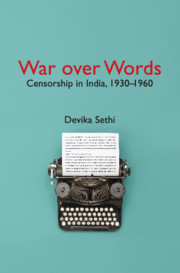Book contents
- Frontmatter
- Dedication
- Contents
- Acknowledgements
- List of Abbreviations
- Introduction
- Part I Guarding the State, Protecting the Public: Censorship Policies and Practices in the 1930s
- 1 The Power of Print
- 2 Provincial Autonomy (1937–1939) and Free Speech Controversies
- Part II Protests and Publicity: Banning Non-Indian Authors
- Part III Political or Military? Censorship in India during the Second World War
- Part IV The Censored Turn Censors: Freedom and Free Speech
- Conclusion
- Epilogue
- Bibliography
- Name Index
- General Index
2 - Provincial Autonomy (1937–1939) and Free Speech Controversies
from Part I - Guarding the State, Protecting the Public: Censorship Policies and Practices in the 1930s
Published online by Cambridge University Press: 26 April 2019
- Frontmatter
- Dedication
- Contents
- Acknowledgements
- List of Abbreviations
- Introduction
- Part I Guarding the State, Protecting the Public: Censorship Policies and Practices in the 1930s
- 1 The Power of Print
- 2 Provincial Autonomy (1937–1939) and Free Speech Controversies
- Part II Protests and Publicity: Banning Non-Indian Authors
- Part III Political or Military? Censorship in India during the Second World War
- Part IV The Censored Turn Censors: Freedom and Free Speech
- Conclusion
- Epilogue
- Bibliography
- Name Index
- General Index
Summary
Issues of free speech continued to be important after the grant of provincial autonomy (in keeping with the Government of India Act of 1935) and the formation of elected Congress ministries in seven out of eleven provinces of British India in 1937. In the words of historian Sunil Chander, Congress ministries had to perform a ‘delicate manoeuvre’: ‘to combat the [political] militants, they required the support of the authorities and to challenge the Raj, they required the support of the militants’. While performing this balancing act they also had to be ‘seen as being uncompromisingly nationalist’.
In late December 1937, the (now Congress-run) UP government issued a statement warning political activists not to use ‘irresponsible language’. A newspaper that supported this decision commented that it could ‘understand the embarrassment of a Government which in the interests of law and order feels compelled to enforce a law which it has been all along the pride of its members to violate and disobey’. Noting the growing indiscipline among party members, and the increasing ‘spirit of license’ manifesting itself in violent speech and action, the article continued:
A person who talks in terms of fiery extremism at one time may be a hero but at another time he may be worse than a traitor to his party, and a dangerous associate. We do not wish to suggest that just because Congress ministries govern seven provinces, we should cease to think progressively or even in radical terms…. But just because our nominees are in power, we must not say or do things which impair discipline, and militate against peace, law and order. If we do so we betray our utter incompetence to govern ourselves.… We may criticise them [Congress ministries]. We may guide and advise them. We may at times even oppose them. But at no time and on no account must we embarrass them.
Reading this newspaper's comment against the grain, it is clear that tendencies that were tolerated or encouraged by the Congress-as-opposition returned to haunt the Congress-as-government.
- Type
- Chapter
- Information
- War over Words , pp. 40 - 58Publisher: Cambridge University PressPrint publication year: 2019



